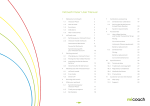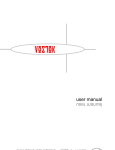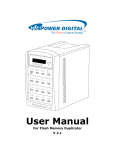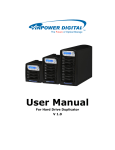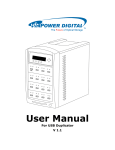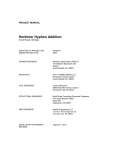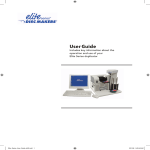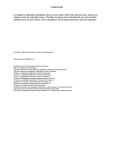Download Reflex Flash Duplicator User manual
Transcript
User Manual For Reflex Flash Duplicator V 2.1 WARNING! THIS FLASH MEMORY DUPLICATOR IS MEANT FOR BACK UP AND DISTRIBUTION OF ORIGINAL DATA AUTHORED OR OWNED BY THE USER. ANY COPIES MADE FROM THIS FLASH MEMORY DUPLICATOR ARE THE COPYRIGHTED, PROPERTY OF THE AUTHOR OR COMPANY WHO OWNS THE SOURCE DATA. ANY UNAUTHORIZED COPYING, EDITING, OR ANY PART THEREOF OF COPYWRITTEN MATERIAL IS STRICTLY PROHIBITED. WE DISCOURAGE THE USE OF ANY SUCH ACTION THAT GIVES RISE TO CRIMINAL INTENT AND PROSECUTION. THE SELLER OF THIS PRODUCT IS NOT RESPONSIBLE FOR ANY POTENTIAL ILLEGAL ACTIONS OF THE USER DUE TO ACTIVITIES BEYOND THE SCOPE OF THE PRODUCT’S INTENDED USE. Copyrights and Trademarks ALL RIGHTS RESERVED. NO PART OF THIS PUBLICATION MAY BE REPRODUCED IN ANY MEDIUM, PRINTED OR ELECTRONIC, WITHOUT THE PRIOR WRITTEN PERMISSION FROM THE MANUFACTURER. COPYRIGHT©20002010. ALL RIGHTS RESERVED. Table of Contents Title Page Chapter 1: Introduction & Manual Overview ………………...…….……….……… Before getting started ………….……………………………………….……. Package Accessory List ………………………………...…………………… Chapter Overview ……………………………………...……………….……. Chapter 2: Getting to know the system ………………………….………………… System Overview ………………………………………...……….…………. LCD Display & Operation Panel ……...………..…...………………………. Flash Device Port Status Indicator …………….….…..……………………. Menu Navigation ………………………………………..……………………. Chapter 3: Basic Operations …………………………..……...…………………….. Make Copies of a Flash Device ..…………………….………..……………. Make Copies of a Flash Device via Async Copy ….………………………. Chapter 4: Device Menu Overview ……………….….…………………………….. Appendix A: Troubleshooting ………………………………..….…………………... Common Concerns ………..…..…………………………………..………… Error Codes .……………………….…..…………….……………………….. Appendix B: Safety & Regulatory information …………...………………………... 1 1 2 2 3 3 4 4 5 6 6 9 13 17 17 18 20 Chapter 1: Introduction & Manual Overview This system is a reliable, high performance, high speed, standalone manual duplication system. With its professional industrial design and simple user interface, it will make your duplicating experience easier than ever. Before getting started: Before starting to use this system, please read the following to ensure proper operation: 1. Temperature Warning: If the system was stored in a location where the temperature dropped below 32⁰F (0⁰C) within the past 24 hours, please leave the system in a warm room with a temperature of at least 65⁰F (19⁰C), for 4 hours prior to powering on the unit for the first time. Failure to do so may cause irreparable harm and prevent the system from functioning properly. 2. Maintenance: It is very important to operate and keep the system in a clean, dust free, environment. Dust is the number one reason for the failure of electronic devices. Leaving the machine in a dusty environment may severely damage the system. It is strongly suggested that an Air Cleaner be placed next to the system and that an air duster (canned air) be used consistently to clear off any dust, which may accumulate on the surface of the system. 3. Proper Shutdown: To avoid possible system failures, the system needs to be shutdown properly. To shutdown the system, press the Up or Down Arrow button until the “Shutdown” menu is appears and then press the “ENT” button. Follow the instructions on the screen to shutdown the system properly. Turning off the system without performing this function will increase the risk of damage to the system. 1 Package Accessory List: System Power Cord System Operation User Manual (This manual) Chapter Overview: Chapter 2: Getting to know the system This chapter describes the physical features and instructions of how to operate the system. Chapter 3: Basic Operations Guide This chapter describes how to perform basic operations like Making Copies, etc. Chapter 4: Menu Overview This chapter describes what each function/setting does. Appendix A: Troubleshooting This section provides many solutions to frequently asked questions and provides insights on system error codes. Appendix B: Safety & Regulatory information This section provides environment, health, safety and other regulatory information. 2 Chapter 2: Getting to know the system System Overview The image below is a representation of the flash duplicator casing. The design of the casing may vary but the unit continue to operate using similar principles. Figure 1-1 System Controls and Display The components shown in Figure 1-1 are: 1. 2. 3. 4. 5. 6. 7. 8. System Power On/Off Button Source Flash Device Port (ex. USB, SD, CF, etc) Target Flash Device Port (ex. USB, SD, CF, etc) Flash Device Port Status Indicator LCD Display & Operation Panel System Ventilation Vents Power Supply Fan Power Cord Input 3 LCD Display & Operation Panel *The below image is for reference only. (Actual screen may vary. ) Up Arrow Button Menu/Option Scroll Up Down Arrow Button Menu/Option Scroll Down Enter/OK Button Enter into the Menu Execute the Function Submit the Setting change Escape Button Go back to the previous Menu Abort the current Function. Cancel the Setting change Smart Copy Raw Copy Device Scan Shutdown Smart Copy Button Shortcut to make a copy under Smart mode RAW Copy Button Shortcut to make a copy under RAW mode Device Scan Button Shortcut to detect available devices Shutdown Button Shortcut to perform Shutdown function of the system Flash Device Port Status Indicator Every flash device port (ex. USB, SD, CF, etc) on the system comes with 2 colored LED lights, which indicate the current status of the port. Please use the Reference chart below to understand the LED status readings: GREEN LED RED LED DESCRIPTION Blinking Off This port is active in terms of reading/writing. On Off A flash device (ex. USB, SD, CF, etc) is connected on this port Off Off A flash device (ex. USB, SD, CF, etc) is disconnected on this port. Off On An error occurred on this port. 4 Menu Navigation The functions and settings that operate this unit are organized in a menu tree structure. The user accesses the 4 buttons on the controller interface panel to navigate through the menu chart and select the desired function or setting: Menu/Option Scroll Up Menu/Option Scroll Down Enter into the Menu Execute the Function Submit the Setting change Go back to the previous Menu Abort the current Function Cancel the Setting change Example: Adjust the “Buzzer” setting in the “Setup” menu: Step 1. Turn on the system by pressing the Power button. After it has booted up, the main menu screen will appear (root menu), signifying the system is ready. Discmakers 1.Copy U.xx (Smart) Step 2. Consecutively press the UP or DOWN arrow button until “7.Setup” appears. Discmakers 7.Setup U.14 Step 3. Press the “ENT” button once to enter into the “Setup” menu. Setup 1.Language Step 4. Consecutively press the UP or DOWN arrow button until “5.Buzzer” appears. Setup 5.Buzzer Step 5. Press the “ENT” button once to enter into the “Buzzer” menu. Buzzer: On Step 6. Press the UP or DOWN arrow button to change the option from “On” to “Off” Buzzer: Off Step 7. Press the “ENT” button once to submit the setting change. The menu will change back to the previous menu, “7.Setup”. Setup 5.Buzzer Step 8. Press the “ESC” button once to go back to the previous menu, the root menu. Discmakers 7.Setup 5 U.xx Chapter 3: Basic Operations Making Copies of a Flash Device This process will copy a flash device (ex. USB, SD, CF, etc), inserted into the Source Port, onto one or more target flash devices simultaneously. There are two ways to make copies of a flash device (ex. USB, SD, CF, etc): Smart Copy: This is the recommended and fastest approach to making copies since it will scan the flash device and copy only the area that contains data. RAW Copy: This is the safest and slowest approach to making copies since it will copy the entire flash device bit by bit. Note: Due to capacity variances among various brands of flash devices, it is advised that the “Size Tolerance” setting be enabled under the “Setup” menu, to avoid unnecessary errors. By enabling this setting, some data/empty spaces may not be copied. Please use with caution. The tutorial guide below demonstrates how to copy a Flash Device. Step 1. Power on the system by pressing the Power button Insert the original flash device (ex. USB, SD, CF, etc) (the drive to be copied) into the Source port. 6 Insert empty target flash devices (ex. USB, SD, CF, etc) (the drive(s) to receive data) into the other nonSource ports. Note: If the flash devices inserted contain data, all data on those devices will be erased permanently. Please insert with caution. Step 2. After it has booted up, the screen on the left should appear signifying the system is ready. Press the “F1 Smart Copy” button to initiate the copying process. Step 3. Any new devices detected will reset the countdown period. If the system detects all the available ports have been occupied or the “ENT” button is pressed, then the system will execute the Copy process immediately. The system will scan the Source flash device and proceed with the Copy process immediately. (Shown on the left) Below explains the various items on the copy progress screen: 3820M, this indicates the amount of data to be copied. 3m44s, this indicates the time left for the copy operation. 14%, this indicates the progress of the copy operation. 7 Upon completion, the system will display the job report. Below explains the various items in the job report: OK:03 – indicates the number of copies passed in this process. (3 in this example) NG:00 – indicates the number of copies failed in this process. (0 in this example) Job:003 – indicates the number of copies in this entire job. Step 4. Remove all the target devices for the current job and proceed to either: Make more copies by connecting more flash devices (if so, return to step 3) or . . . OR End the job and go back to the root menu by pressing the “ESC” button. 8 Making Copies of a Flash Device via Async Copy This revolutionary (patent pending) process will perform the duplication of any flash device (ex. USB, SD, CF, etc) the moment it is inserted into the system without waiting for the current job to be completed. Unlike other competing products, it will have neither performance sacrifices nor capacity limitations. The guide below demonstrates how to copy a Flash Device using Async Mode. Step 1. Power on the system by pressing the Power button. Step 2. After it has booted up, the screen on the left should appear signifying the system is ready. . Insert the original flash device (ex. USB, SD, CF, etc) (the drive to be copied) into the Source port. 9 Insert empty target flash devices (ex. USB, SD, CF, etc) (the drive(s) to receive data) into the other nonSource ports. Note: If the flash devices inserted contain data, all data on those devices will be erased permanently. Please insert with caution. Press the DOWN button to be guided to the “Async Copy” menu. Press the “ENT” button to start the “Async Copy” process. Step 3. During the copying process, additional flash devices can be inserted and copied without waiting for the current process to be completed. Below explains the various items on the Async Copy progress screen: 3820M – indicates the amount of data to be copied. Working: 2 – indicates the number of flash devices being copied. This number will increase as flash devices are inserted and decrease as flash devices have completed the copy process. 14% – this indicates the copy progress 10 Pass/Fail Counter: During the copying process, the Pass/Fail counter is shown once every five seconds. It indicates number of passes and failures during the entire job. Async Copy LED display: GREEN LED RED LED Blinking Off On Off Off Off Off On On On 11 DESCRIPTION The device in this Port is currently copying data. The device in this Port is waiting to be copied. There are no devices connected to this port. An error occurred for the device in this port during the copying progress. The device in this Port has successfully copied. It is safe for removal. When a flash device has successfully copied, both the GREEN LED and the RED LED lights will be lit for the connected port. The device can safely be removed. If additional flash devices are to be copied, the new devices can be added without waiting for all the others to completely finish. The new ones can be inserted on the fly (at any time). Step 4. When all the flash devices have been successfully copied, the “Working” indicator will be reduced to “0” and the current working status will change to “Waiting”. The job can be ended immediately and the unit returned to the root menu by pressing the “ESC” button. 12 Chapter 4: Device Menu Overview This system comes with many features that can be accessed/adjusted by various functions and settings within the operation menu. Please see the detailed descriptions below: 1. Copy This process will copy the flash device (ex. USB, SD, CF, etc), which is inserted into the Source Port, onto one or multiple target Flash Devices simultaneously. 2. Async Copy This revolutionary (patent pending) process will perform the duplication of any flash devices (ex. USB, SD, CF, etc) the moment they are inserted into the system without waiting for the current job to be completed. Unlike other competing products, it will not have any performance sacrifices nor capacity limitations. 3. Compare This function performs a data comparison between the Flash Device (ex. USB, SD, CF, etc) that is connected into the Source Port and all other Flash Devices connected to the other ports simultaneously. 4. Copy+Compare This function performs the Copy process, after which, it will perform a Compare process automatically to ensure data accuracy. 5. Erase This function erases the flash Device(s) connected to any port other than the Source Port. There are four options for this function: Quick Erase: It will erase only the beginning section of the flash device (ex. USB, SD, CF, etc), which is just enough to make it look empty. Then it will format the Flash Device using FAT32 File System. Full Erase: It will erase the entire flash device (ex. USB, SD, CF, etc) by writing 0’s throughout. Then it will format the flash device using FAT32 File System. The erase timeframe varies depending on the data capacity of the flash device. RAW Erase: This function is identical to “Full Erase”, except that it does NOT format the flash device (ex. USB, SD, CF, etc). Secure Erase: It will erase the flash device (ex. USB, SD, CF, etc) thoroughly to avoid any possible chances of recovery. 6. Copy Mode This setting will allow for the selection of a Copy Mode. There are 2 options: Smart Copy: This is the recommended and fastest approach to making copies since it will scan the flash device (ex. USB, SD, CF, etc) and copy only the area which contains data. RAW Copy: This is the safest and slowest approach to making copies since it will copy the entire flash device (ex. USB, SD, CF, etc) bit by bit. 13 7. Setup 1) Language This setting will allow you to choose the display language of the system. 2) Read Error Skip* This setting will allow for the change to the number of times the system will skip ahead when it encounters a reading error, while reading the original flash device (ex. USB, SD, CF, etc). By default, the system does not skip any reading error. Under this setting, if the system encounters any errors, it will result in an immediate job failure. *This function will not fix any discovered error(s); it will merely skip it and copy the remaining data. 3) Write Error Skip* This setting will allow for the change to the number of times the system will skip when it encounters a writing error during the copying process. By default, the system does not skip any writing errors. Any writing errors will result in an immediate failure on this flash device (ex. USB, SD, CF, etc). *This function will not fix the error; it will only skip it to write the remaining data. 4) Size Tolerance Normally, the capacity of the empty flash devices (ex. USB, SD, CF, etc) is required to be greater than the original flash device (ex. USB, SD, CF, etc) so that all of the data can be copied without loss. However, not all flash devices (ex. USB, SD, CF, etc) have identical storage capacity, even when they are all labeled identically in terms of GB size. Thus, by enabling the size tolerance, the system will allow the empty flash device’s capacity to be less than the original flash device by the percentage specified. 5) Buzzer This setting will allow the choice to hear a beep sound when a button is pressed or when a task has been completed. 6) Screen Saver This setting will allow the choice to enable the Screen Saver feature or not. By enabling this feature, a screen saver will be displayed when the system has been idle for an extended period. 14 8. Utilities 1) Device Info This function will show information regarding the flash device connected to the system. 2) System Info This function will show the system’s hardware & software information. 3) Measure Speed This function will scan any inserted flash device(s) (ex. USB, SD, CF, etc) in any socket. The display will show the reported capacity and the Read/Write Speed of the selected device. 4) Verify Source This function will scan the original flash device for readability. 5) Rebuild Source This function will rebuild the original flash device in case of high Compare failure. 6) Load Default This function will reset all of the options back to the manufacturers default settings. Perform this function if the system is acting abnormal. Perform the “Shutdown” operation and restart the system in order for these changes to take effect. 7) Update Firmware This function will update the software for the system. To update: a. Copy the manufacturer certified update file onto a USB Storage Device via a PC/Mac. b. Insert the USB Storage Device into the Source Port of the system. c. Go to this function and execute it by pressing the “ENT” button. d. Restart the system when asked to do so. It is strongly suggested that an upgrade to the system’s firmware not be performed, unless the system is getting unstable and instructed to do so by a technician. 8) Save This function will save all the settings modified since the last time the system was booted-up. 15 9. Manage Accounts This menu will allow the Administrator to perform the following user administrative tasks. This feature is disabled by default. Prior to activating this feature, the duplicator recognizes all users as the only activated user defined as the administrator. The predefined password for this menu is “0000”. 1) View User This menu allows for the viewing of the existing user accounts. 2) Create User This menu allows for the creation of additional user accounts. Each user has individual settings. During this process, there are prompts to enter a new user name (up to 8 alphanumeric letters or numbers) and user password (consisting of a 4-digit number) for the new account. 3) Delete User This menu allows for the deletion of an existing user account. During this process, there is a prompt to select the existing account to be removed. *User “Admin” is the administrative account; this account CANNOT be deleted. 4) Password on Bootup This menu allows for the enabling/disabling of the user administrative feature prompt, and user login upon boot up. 10. Shutdown This function saves any system settings that have been modified since powering on the system, using this option will prevent loss of settings. Once the Ready to Power OFF message appears, the system can be safely turned off via the machine Power Switch. Turning off the system without performing this function will increase the risk of damaging the system. 16 Appendix A: Troubleshooting Common Concerns 1. No display on the LCD or the unit does not operate when the power is on. Check the power cable connection and that the environment for the power outlet is normal. Make sure the power voltage on the duplicator matches the voltage of the power outlet. If the system was stored in a location where the temperature dropped below 32⁰F (0⁰C) within the past 24 hours, leave the system in a warm room with temperatures at least 65⁰F (19⁰C) for 4 hours prior to powering it on. 2. The system cannot recognize the original USB Storage Device. Check to make sure the original USB Storage Device is inserted into the Source Port. 3. Buttons do not function. The system could still be busy on a task. Give it some time and press it again. If it still doesn’t work, turn off the machine, and then restart the machine after a minute. 4. Copy process completed but the copied flash devices are not readable / executable? Change the “Copy Mode” to “RAW Copy”; this can solve data related issues. Use the “Compare” function to check that the copied flash device(s) are identical to the original flash device. The Read Error Skip or Write Error Skip settings under the “Setup” menu, may have turned on inadvertently. It is possible the skipped data (due to read/write error) may be causing this issue. 5. The failure rate is high. Quality of the flash device may be substandard. Please try other name branded flash devices. 6. Do I need to upgrade the system’s firmware? Unless the system is getting unstable, it is strongly suggested not to upgrade the firmware on the system. Please contact Tech Support if the system is getting unstable. 7. Cannot boot-up or fails to upgrade firmware. Contact Tech Support for assistance. 8. Some empty flash devices will not copy. Normally when inserting a flash device in the system, the green LED will light to indicate the system recognizes the flash device. Please make sure the green LED is lit. If not, then the system did not recognize the flash device, hence will not copy onto it. Quality of the flash device may be substandard. Please try other name brand flash devices. 17 Error Codes Typically, the system will show an error message and error code if a problem occurs. Please reference the below diagram for a description of the error codes and the recommended solution: Error Error Code Message Description & Recommended Solutions Description: The Copy process failed due to reading error of source flash device. 201 Bad Master Possible Solution: Try to remove and re-connect the source flash device to the system. Try to re-create a new source flash device using a PC (after a full format.) Description: The Copy process failed due to failure to detect any target flash devices to be copied. 202 No Device Found Possible Solution: Try to remove and re-connect the flash device to the system. Please make sure the Green indicator is lit for the corresponding flash device ports of the system. Description: The “Async Copy” process failed because the source flash device has not been detected. 203 Source Removed Possible Solution: Try to remove and re-connect the flash device to the system. Please make sure the Green indicator is lit for the corresponding flash device ports of the system. Description: The content of the original flash device has a larger capacity than the flash device(s) intended to receive the copy. 206 Targets & Master Size Mismatch! Possible Solution: If copying under “RAW” mode, it is common for this message because storage capacities vary among different brands of flash devices. It might be advisable to enable the “Size Tolerance” setting under the “Setup” menu to avoid unnecessary errors. However, by doing this, there may be some data/empty spaces not copied. Please use with caution. If copying under “RAW” mode, it might be advisable to try “Smart” mode since it copies only data area, nothing else. If copying under “Smart” mode, it is possible that the data is heavily fragmented. Please defragment the source flash device on a PC before copying 18 Error Error Code Message Description & Recommended Solutions Description: The password entered is not correct 240 Wrong Possible Solution: Password! Please confirm the correct password was typed or try a different password. Description: An incorrect password was entered 3 times consecutively 241 Login Failed Possible Solution: Wait for 5 minutes, then try to use the correct password for the next attempt. If the problem persists, call Tech Support. Description: The system CANNOT locate the Firmware Update File during the Update Firmware process. 260 261 262 No Update File Wrong update File Unknown flash model Possible Solution: Confirm the file is not a “zip” file. If it is, please extract it before transferring it to a flash device. Confirm the file system of the flash device is FAT32. Make sure there are no other flash device(s) attached in the system and try to insert the flash device that contains the update file into another flash device port to perform the operation. Description: The Firmware Update File is not compatible with the system or the Firmware Update File is corrupted. Possible Solution: Try to re-download the correct Firmware Update File. Description: The Firmware Update File is not meant for the system. Possible Solution: Contact Tech Support for the proper Update file. 19 Appendix B: Safety & Regulatory information Safety Introduction Notices and Safety Please read the following instructions carefully before operating the machine and refer to them as needed to ensure the continued safe operation of the machine. This product and supplies have been designed and tested to meet strict safety requirements. These include safety agency evaluation and certification, and compliance with electromagnetic regulations and established environmental standards. The safety and environment testing and performance of this product have been verified using certified materials only. Unauthorized alterations, which may include the addition of new parts/devices, may impact the product certification. Please contact a sales representative for more information. Marks, Labels, Symbols All warnings and instructions marked on or supplied with the product should be followed. This symbol alerts users to areas of the equipment where there is the possibility of personal injury. FCC Notices for USA This equipment has been tested and found to comply with the limits for a Class B digital device, pursuant to Part 15 of the FCC Rules. These limits are designed to provide reasonable protection against harmful interference in a residential installation. This equipment generates uses and can radiate radio frequency energy and, if not installed and used in accordance with the instructions, may cause harmful interference to radio communications. However, there is no guarantee that interference will not occur in a particular installation. If this equipment does cause harmful interference to radio or television reception, which can be determined by turning the equipment off and on, the user is encouraged to try to correct the interference by one or more of the following measures: - Reorient or relocate the receiving antenna. - Increase the separation between the equipment and receiver. - Connect the equipment into an outlet on a circuit different from that to which the receiver is connected. - Consult the dealer or an experienced radio/TV technician for help. (Reference CFR 47 Part 15 Section 15.21) Changes or modifications to this equipment not specifically approved by the manufacture may void the user’s authority to operate this equipment. 20 Safety Information Operational Safety Information This equipment and supplies have been designed and tested to meet strict safety requirements. These include safety agency examination, approval, and compliance with established environmental standards. To ensure the continued safe operation of the equipment, follow these safety guidelines at all times: Do These Always follow all warnings and instructions that are marked on or supplied with the equipment. Before cleaning this product, unplug the product from the electrical outlet. Always use materials specifically designated for this product, the use of other materials may result in poor performance and create a hazardous situation. Always exercise care when moving or relocating equipment. Always locate the machine on a solid support surface (not on plush carpet) that has adequate strength to support the weight of the machine. Always unplug this equipment from the electrical outlet before cleaning. Do not use aerosol cleaners. Aerosol cleaners can be explosive or flammable when used on electromechanical equipment Never Do These Never use a ground adapter plug to connect the equipment to a power outlet that lacks a ground connection terminal. Never attempt any maintenance function that is not specifically described in this documentation. Never obstruct ventilation openings. They are provided to prevent overheating. Never remove covers or guards that are fastened with screws. There are no operator serviceable areas within these covers. Never locate the machine near a radiator or any other heat source. Never push objects of any kind into the ventilation openings. Never place this equipment where people might step on or trip on the power cord. 21 Electrical Safety Information 1. The power receptacle for the machine must meet the requirements stated on the data plate on the rear of the machine. If there is uncertainty that the electrical supply meets the requirements, please consult the local power company or an electrician for advice. 2. The socket outlet shall be installed near the equipment and shall be easily accessible. 3. Use the power cable that is supplied with the machine. Do not use an extension cord, remove, or modify the power cord plug. 4. Plug the power cable directly into a correctly grounded electrical outlet. If there is any doubt regarding the correct grounding of the desired outlet, consult an electrician. 5. Do not use an adapter to connect any equipment to an electrical outlet that lacks a ground connection terminal. 6. Do not place this equipment where people might step or trip on the power cable. 7. Do not place objects on the power cable. 8. Do not push objects into the slots or openings of the machine. Electrical shock or fire may result. 9. Do not obstruct ventilation openings. These openings are used to provide proper cooling to the machine. Electrical Supply 1. This product shall be operated from the type of electrical supply indicted on the product’s data plate label. If there is uncertainty that the electrical supply meets the requirements, please consult a licensed electrician for advice. 2. Always connect equipment to a correctly grounded power outlet. If in doubt, have the outlet checked by a qualified electrician. This equipment must be connected to a protective earth circuit. This equipment is supplied with a plug that has a protective earth pin. This plug will only fit into an earthed electrical outlet. This is a safety feature. If you are unable to insert the plug into the outlet, contact a licensed electrician to replace the outlet. Disconnect Device The power cable is the disconnect device for this equipment. It is attached to the back of the machine as a plug-in device. To remove all electrical power from the equipment, disconnect the power cable from the electrical outlet. 22 Emergency Power Off If any of the following conditions occur, turn off the machine immediately and disconnect the power cable(s) from the electrical outlet(s). Contact an authorized Service Representative to correct the problem: The equipment emits unusual odors or makes unusual noises. The power cable is damaged or frayed. A wall panel circuit breaker, fuse, or other safety device has been tripped. Liquid is spilled into the machine. The machine is exposed to water. Any part of the machine is damaged Maintenance Information 1. Any operator product maintenance procedures will be described in the user documentation supplied with the product. 2. Do not carry out any maintenance on this product which is not described in the customer documentation 3. Use supplies and cleaning materials only as directed in the Operator section of this manual. 4. Do not remove covers or guards that are fastened with screws. There are no parts behind these covers that you can maintain or service. Do not use aerosol cleaners. Aerosol cleaners can be explosive or flammable when used on electromechanical equipment. Regulatory Information Certifications in Europe: CE Mark (European Union) The CE mark applied to this equipment symbolizes the manufacturerers declaration of conformity with the following applicable Directives of the European Union as of the dates indicated: 2006/95/EC December 12, 2006 Council Directive 2006/95/EC as amended. Approximation of the laws of the member states related to low voltage equipment. 2004/108/EC December 15, 2004 Council Directive 2004/108/EC as amended. Approximation of the laws of the member states related to electromagnetic compatibility. A full declaration of conformity, defining the relevant directives and referenced standards, can be obtained from a Authorized local dealer. In order to allow this equipment to operate in proximity to Industrial Scientific and Medical (ISM) equipment, the external radiation from the ISM equipment may have to be limited or special mitigation measures taken. 23


























